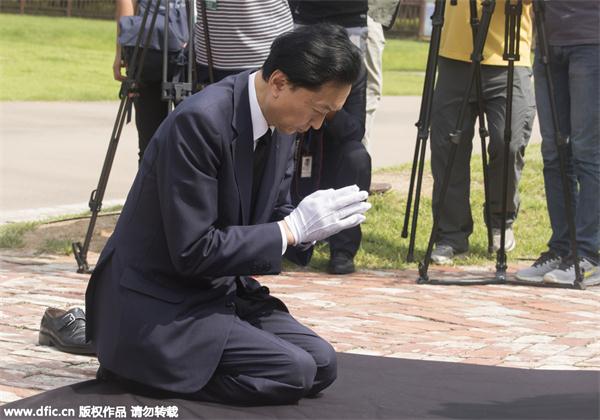Former Japanese PM says genuine apologies should be said to victims
(China Daily) Updated: 2015-08-13 07:43
 |
|
Japan´s former Prime Minister Yukio Hatoyama bows in front of a memorial stone during his visit to the Seodaemun Prison History Hall in Seoul, South Korea. [Photo/IC] |
During a July interview, broadcast at a forum in Northeast China's Heilongjiang Province on Sunday, former Japanese prime minister Yukio Hatoyama said, "as descendants we must apologize to the victims of the war, for so many innocent people were deprived of their lives by the Japanese troops, and we should directly express our genuine apologies". Comments:
As of now, three major questions in regard to Japan's development remain unanswered: Are the country's efforts to get rid of the "postwar system" based on denying its postwar pacifist development? How is it going to become a "normal state" while seeking military development? Will the government continue with its conservatism, historical revisionism and nationalism? It is foreseeable that the international community will have a lot to deal with given that Japan is yet to adopt the right historical perspective.
Li Wei, director of the Institute of Japan Studies at the Chinese Academy of Social Sciences, Aug 11
There are misconceptions of Japan among the Chinese public even today. First of all, some Chinese people call it "little Japan". Yet it is world's third-largest economy with a territory of more than 370,000 square kilometers, is home to more than 100 million people, and has territorial waters and exclusive economic zones of about 4 million square kilometers.
More, it was not the Japanese people who schemed the invasion of China before and during World War II, but a few militarist politicians. The invaders were never part of Chinese culture as they attempted to eradicate the Chinese nation and make it part of Japan.
The complicated characteristics of Japan are sometimes simplified into a duality of "politeness and belligerence" as the US anthropologist Ruth Benedict observed in her influential study of Japan, The Chrysanthemum and the Sword. Yet some Japanese island adventurers' ambition to dominate Asia still exists today, and the international community should be alert to this.
Historically, China and Japan have co-existed in Asia. Both countries can jointly lead the development of Asia rather than fighting for the leadership.
People's Liberation Army Daily, Aug 8
Admittedly, we should never let down our guard given Japan's attempt to relive the militarist past, though we do not have to overstate the possibility of its remilitarization either. A vicious cycle may take shape if right-wingers in Tokyo decide to enlarge their country's military muscle to deal with the make-believe "China threat". Such being the case, the remaining militarism upholders in Japan intend to make institutional differences to the country, leading it further away from the path toward true pacifism.
People's Tribune, Aug 11











